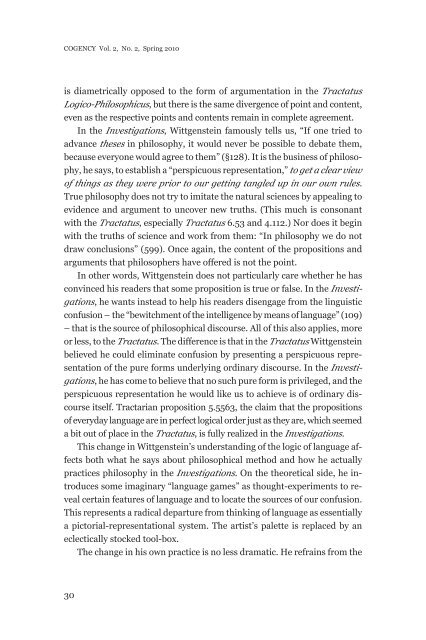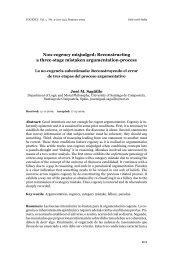Cogency v2 n2
Cogency v2 n2
Cogency v2 n2
You also want an ePaper? Increase the reach of your titles
YUMPU automatically turns print PDFs into web optimized ePapers that Google loves.
COGENCY Vol. 2, N0. 2, Spring 2010<br />
is diametrically opposed to the form of argumentation in the Tractatus<br />
Logico-Philosophicus, but there is the same divergence of point and content,<br />
even as the respective points and contents remain in complete agreement.<br />
In the Investigations, Wittgenstein famously tells us, “If one tried to<br />
advance theses in philosophy, it would never be possible to debate them,<br />
because everyone would agree to them” (§128). It is the business of philosophy,<br />
he says, to establish a “perspicuous representation,” to get a clear view<br />
of things as they were prior to our getting tangled up in our own rules.<br />
True philosophy does not try to imitate the natural sciences by appealing to<br />
evidence and argument to uncover new truths. (This much is consonant<br />
with the Tractatus, especially Tractatus 6.53 and 4.112.) Nor does it begin<br />
with the truths of science and work from them: “In philosophy we do not<br />
draw conclusions” (599). Once again, the content of the propositions and<br />
arguments that philosophers have offered is not the point.<br />
In other words, Wittgenstein does not particularly care whether he has<br />
convinced his readers that some proposition is true or false. In the Investigations,<br />
he wants instead to help his readers disengage from the linguistic<br />
confusion – the “bewitchment of the intelligence by means of language” (109)<br />
– that is the source of philosophical discourse. All of this also applies, more<br />
or less, to the Tractatus. The difference is that in the Tractatus Wittgenstein<br />
believed he could eliminate confusion by presenting a perspicuous representation<br />
of the pure forms underlying ordinary discourse. In the Investigations,<br />
he has come to believe that no such pure form is privileged, and the<br />
perspicuous representation he would like us to achieve is of ordinary discourse<br />
itself. Tractarian proposition 5.5563, the claim that the propositions<br />
of everyday language are in perfect logical order just as they are, which seemed<br />
a bit out of place in the Tractatus, is fully realized in the Investigations.<br />
This change in Wittgenstein’s understanding of the logic of language affects<br />
both what he says about philosophical method and how he actually<br />
practices philosophy in the Investigations. On the theoretical side, he introduces<br />
some imaginary “language games” as thought-experiments to reveal<br />
certain features of language and to locate the sources of our confusion.<br />
This represents a radical departure from thinking of language as essentially<br />
a pictorial-representational system. The artist’s palette is replaced by an<br />
eclectically stocked tool-box.<br />
The change in his own practice is no less dramatic. He refrains from the<br />
30








